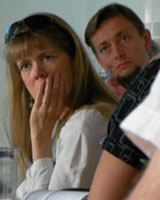 |
The Jacobssons listen to questions after the presentation. |
Media Competition and Journalistic Performance Not Linked, Team of U.S. and Swedish Researchers Report at Conference
More media competition does not always lead to increase in the level of media quality, a team made up of Swedish and U.S. researchers told an international gathering of media scholars at the University of Stockholm in late July.
The team said their research showed evidence that across the 76 countries studied there was no evidence that media markets with high levels of competition were those that also had better journalism. In fact, there was slight evidence that higher levels of competition were actually associated with lower levels of journalistic performance.
In the African countries studied, the group found clear evidence that competition was associated with poorer journalism.
The findings challenge the dominant argument in the economics and communication literature of the positive consequences of media competition, according to the report of the team, made up of researchers at the University of Georgia, Stockholm University, and the Swedish Royal Institute of Technology.
The findings also have implications for international aid organizations interested in furthering media development around the world, according to the team. By subsidizing and even creating media outlets in the developing world, these agencies may contribute to high levels of competition that work against high journalistic performance.
The markets simply are not able to sustain the number of media outlets in such markets, leading to hidden subsidies, bribes to journalists, and other factors that work against sound journalistic practices.
The paper was presented to the Journalism Research and Education Section at the International Association for Media and Communication Research World Congress, held from July 20 to 25 on the campus of Stockholm University.
Authors of the report were Eva-Maria Jacobsson of the School of Computer Science and Communication, Swedish Royal Institute of Technology, Dr. Lee B. Becker, Dr. Tudor Vlad and Dr. C. Ann Hollifield of the Grady College of Journalism and Mass Communication, University of Georgia, and Dr. Adam Jacobsson of the Department of Economics, Stockholm University.
Dr. Becker is director of the James M. Cox Jr. Center for International Mass Communication Training and Research in the Grady College, and Dr. Vlad is associate director of the Cox Center. Dr. Hollifield is head of the Department of Telecommunications in the Grady College.
The researchers used measures of media performance gathered by the International Research and Exchange Board (IREX) in their research. IREX measured journalistic performance as part of its effort to measure Media Sustainability in 76 emerging media markets.
The team used Gross Domestic Product Purchasing Power Parity as a surrogate for media advertising revenues because advertising data were unavailable for a majority of the countries studied.
“The number of media outlets can change quickly in the type of emerging markets that we are studying,” the team noted.
The researchers also acknowledged that comparable measures of professional journalism currently are available only for countries whose media systems are considered to be undergoing transitions. Consequently, large numbers of countries with relatively mature media systems were not included in these analyses.
Just fewer than 1,000 participants representing 86 countries attended the Stockholm conference.
The paper presented by the team was titled “The Impact of Market Competition on Journalistic Performance.” The same team had presented a paper based on a smaller number of countries at a conference in Germany in 2006.
- Paper presented in Stockholm.
- Powerpoint presentation given by the team at the Stockholm conference.
- 2006 paper by the team presented at the conference in 2006 in Germany.
- Dr. Adam Jacobsson's presentation at the conference.

